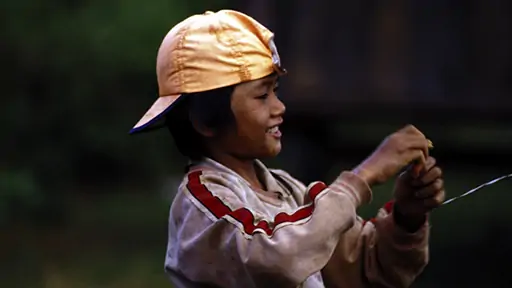Indigenous Calendar February, 2017: Games Without Frontiers

Games have been a part of human cultures for thousands of years. So it shouldn't surprise us that the most-searched term, globally, on Google last year was "Pokemon Go." Games without Frontiers was a European TV game show, popular from the mid 1960s to the early 1980s. It is also a 1980 song written by musician and activist Peter Gabriel. Initially, it was perceived as a simple pop song. But with lyrics like: "André has a red flag/Chiang Ching's is blue/They all have hills to fly them on/Except for Lin Tai Yu" it should have been clear that it was the anti-war song it is now recognized as. Thirty-seven years later the song is just as relevant.
Gabriel was drawing parallels between the childish format of the TV show and foreign policies of world powers. The song implicates governments for their involvement in wars as merely a game — with little regard for the human consequences. Given the time he was writing it, the idea for the song would have been inspired by events in places including Afghanistan, Southeast Asia and Central America. It would not have been inspired by events in a country called, at the time, Yugoslavia. It would be the next decade before war games would commence there and, eventually, break that country into pieces along ethnic and religious lines. Serbia was one of the countries created from the conflict.
Gabriel was also playing on the ambiguity of the word 'frontier.' We typically think of it as meaning international border. When the Mnong settled in what are now Cambodia and Vietnam, there were no international borders. Any young Mnong boy flying his kite back then would have been playing a game without frontiers. But the word can also mean boundary in a figurative sense. So Gabriel's implication is that world powers get involved in wars even when they cross boundaries such as ethical and religious ones. When I photographed this young Mnong boy flying his kite in northeastern Cambodia, he was playing a game within that country's frontier, but without crossing any figurative boundaries.
Last month a train left Belgrade, Serbia on a journey to Mitrovica. The big question was: would it be a train without frontiers? The answer is not so simple. The world is as divided as Yugoslavia on the question of whether Mitrovica is in a different country called Kosovo. The train itself was clear on the question: it was painted in the colors of Serbia's flag and had "Kosovo is Serbian" written on the outside in large letters in twenty different languages. In the end the train stopped before it reached the disputed border amid accusations from Serbia that Kosovo was playing war games. I don't know if there was a teapot on the train.
A year earlier news surfaced of the release by NIL Entertainment of Survival Island 3: Australia Story 3D. It is a video game that rewards players for killing indigenous Australians. Fortunately, an online petition to ban the game was signed by tens of thousands of people and, within days, all major vendors had stopped selling it. It was even referred to the Australian Human Rights Commission under that country's Racial Discrimination Act. NIL Entertainment now appears to have gone out of business. Good riddance!
From the video game developer, to the publisher, to the vendors who briefly sold it, there must have been many people who reviewed it. Not one of them recognized it for the game without frontiers that it so clearly was. They didn't have to look far to see how indigenous culture can inform game design. Never Alone, The Path of Useköl, Ehdrigohr and Honour Water are just a few examples of how it can. At the 2017 Game Developers Conference later this month there will be a special Indigenous Games Lightning Talks plenary session featuring practitioners discussing how to design games for and about indigenous people.
Gabriel once said: "Maybe we are born racist, in that we naturally distrust anything different from, or foreign to, us. It is only curiosity, exposure and familiarity that opens us up to the much richer and more exciting world that exists beyond our own." Had he been nominated for — and won — Best Original Song at this month's Academy Awards, he would have probably said something similar but updated for today's world. Perhaps more of us should listen to and learn from people like him.
The Mnong are featured in our documentary, Indigenous Peoples of Southeast Asia.
If you enjoyed reading this article, please consider supporting independent, advertising-free journalism by buying us a coffee to help us cover the cost of hosting our web site. Please click on the link or scan the QR code. Thanks!


